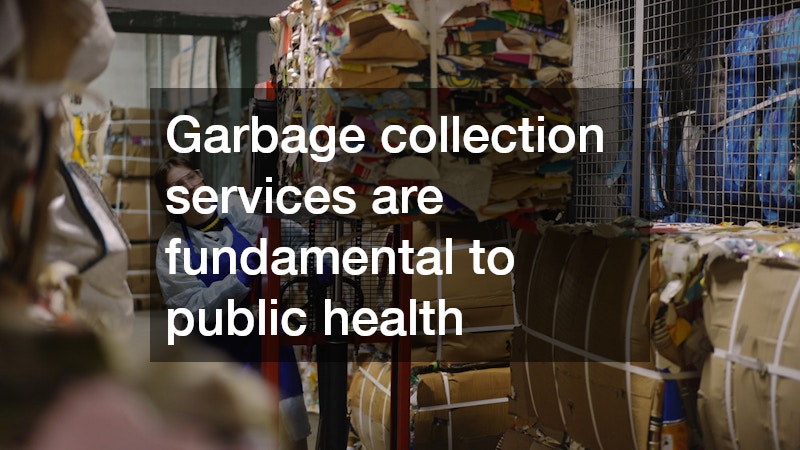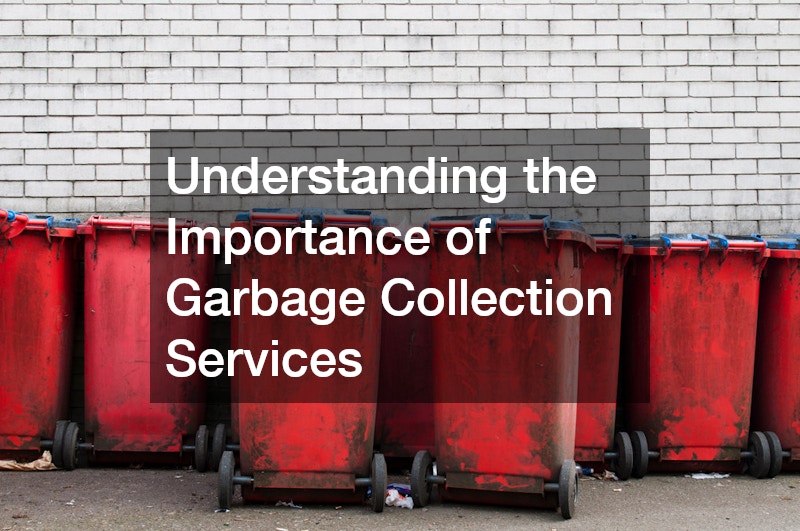Here we will explore the critical role that garbage collection services play in maintaining clean, healthy, and sustainable communities. The proper management of waste is essential for public health, environmental sustainability, and economic efficiency. Through organized collection and disposal methods, these services ensure that communities remain vibrant and livable, paving the way for a better quality of life.
Why are Garbage Collection Services Essential for Public Health?
Avoiding Health Hazards
Regular garbage collection prevents the accumulation of waste that can become a breeding ground for disease-carrying pests and bacteria. Stagnant waste attracts rodents and insects, which are vectors for various infectious diseases. By ensuring consistent removal of garbage, these services play an integral part in mitigating potential health crises.
Moreover, garbage piled up in neighborhoods can release harmful toxins and pollutants into the air and soil. This exposure can negatively impact respiratory health and lead to chronic conditions among residents. Consequently, a well-organized waste collection system is crucial for safeguarding community health.
The proper disposal of waste is also important in reducing incidences of food and water contamination. Without efficient garbage collection, waste can leach into water supplies, posing serious risks to public health. Therefore, the role of these services transcends mere cleanliness, extending to the prevention of widespread health hazards.
Impact on Community Cleanliness
Maintaining clean and pleasant living environments has profound social and psychological benefits. When garbage collection services function effectively, they enhance the aesthetic appeal of communities, leading to improved mental well-being for residents. Clean environments foster pride among community members, encouraging them to take better care of public spaces.
The presence of clean streets and public areas can also lead to increased social cohesion. People are more likely to engage with one another and participate in community activities when their surroundings are tidy and inviting. As a result, effective waste management contributes to stronger neighborhood bonds.
Furthermore, clean environments reduce stress and anxiety, creating a sense of peace and order. The direct relationship between cleanliness and mental health highlights the importance of reliable garbage collection services. By maintaining this standard of living, cities and towns can promote a more harmonious community dynamic.
Waste Segregation and Public Education
Garbage collection services play a pivotal role in educating the public on proper waste segregation and recycling practices. By implementing clear guidelines and providing resources, such services empower communities to participate actively in waste reduction efforts. Education campaigns can significantly improve public understanding of the environmental impact of their waste disposal habits.
Through community workshops and informational materials, residents learn the significance of separating biodegradable and recyclable materials. This knowledge not only enhances recycling efficiency but also reduces the overall volume of waste sent to landfills. By fostering a culture of responsible waste management, these services contribute to more sustainable communities.
The long-term benefits of public education in waste management include increased engagement and environmental stewardship. As individuals become more aware of their responsibility, they are more likely to adopt sustainable consumption patterns. Such educational initiatives are crucial for laying the groundwork for a cleaner and healthier planet.
How do Garbage Collection Services Benefit the Environment?
Reducing Pollution
Effective waste management plays a significant role in curtailing environmental pollution. Garbage collection services help to prevent the release of toxic substances into the air and water by ensuring responsible disposal. This preventive measure directly contributes to the conservation of natural resources and the reduction of greenhouse gas emissions.
The reduction of pollution through proper waste management directly benefits flora and fauna, preserving ecosystems. By minimizing harmful waste exposure, these services protect biodiversity and contribute to the health of natural habitats. Such efforts are critical in maintaining ecological balance and ensuring the planet’s resilience.
Furthermore, efficient garbage collection systems reduce strain on incineration and landfill facilities. By diverting waste from these sites, collection services lower the risk of soil and water contamination. These efforts also extend the lifespan of existing waste treatment infrastructure, lowering the need for new developments that could disrupt natural landscapes.
Promoting Recycling and Reuse
Garbage collection services play a vital role in facilitating recycling initiatives and promoting the reuse of materials. By establishing recycling programs, they provide essential infrastructure for the diversion of recyclable waste from landfills. This promotes the circular economy, reducing dependence on finite resources and minimizing environmental impact.
Recycling programs supported by these services contribute to significant reductions in energy consumption. For example, recycling aluminum saves up to 95% of the energy required to produce new aluminum from raw materials. Such energy savings demonstrate the tangible environmental benefits of prioritized recycling efforts.
Moreover, the promotion of reuse initiatives encourages communities to adopt more sustainable practices. These include supporting second-hand markets and encouraging repairs instead of discarding items. By fostering a culture of reuse, garbage collection services help to lessen environmental strain and promote sustainable lifestyles.
Garbage collection services are fundamental to public health, environmental sustainability, and economic growth. By understanding their importance, communities can implement strategies that enhance their efficiency and effectiveness, contributing to a cleaner, greener, and more sustainable future. It is crucial for cities and municipalities to prioritize waste management as a means of ensuring the well-being and prosperity of their populations.




